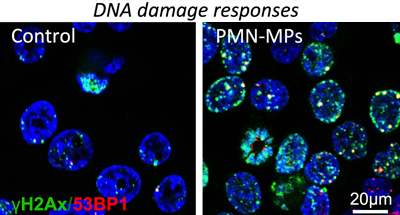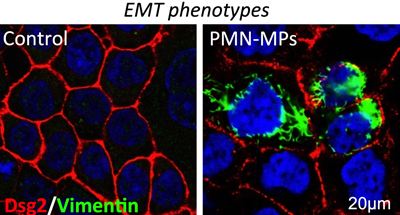Innate Immunity in Colorectal Cancer
Chronic inflammation and persistent injury of the colonic mucosa have been widely recognized as leading risk factors for the development of colorectal cancers (CRC). Patients with inflammatory bowel diseases (IBDs), suffering from recurring flairs of inflammation, impaired barrier function and severe mucosal injury, are at a significantly higher risk of developing CRC compared to healthy individuals. Since PMN infiltration of the intestinal mucosa is a hallmark of IBD, PMNs are bound to play important roles in the development of CRC. Thus, additional studies in our laboratory utilize mouse tumor models and cancer cell cultures to investigate PMN function at the primary tumor site (colon), circulation, and sites of metastasis (lymph nodes and the liver) in an overall effort to define the role for PMNs in inflammation-driven CRC development and metastatic tissue colonization.

Tumor infiltrating neutrophils can secrete membrane-derived microparticles that carry active enzymes and other cellular effectors that can locally alter the tumor environment. For example, neutrophil-derived microparticles can induce potent DNA damage responses to promote genomic instability and tumorigenesis.

Tumor infiltrating neutrophils can secrete membrane-derived microparticles that carry active enzymes and other cellular effectors that can locally alter the tumor environment. As such, we find that neutrophil-derived microparticles can trigger the loss of structural junctional components (such as desmoglein-2, red) and promote the expression and network formation of vimentin, both hallmarks of epithelial to mesenchymal transition (EMT).